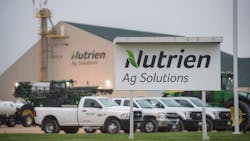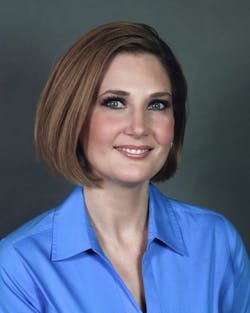Lee Pierce is a fleet manager adept at making the best out of a difficult situation. The Texas-born woman spent much of her childhood learning how to fix things from her engineer father, who himself had a vital role to developing parts for the National Aeronautics and Space Administration (NASA) in the 1960s. Throughout her career, this skill has helped Pierce move up from managing funeral home vehicles to now controlling 71,000 assets (15,000 vehicles and 56,000 trailers and farming equipment) for crop input producer Nutrien Ag Solutions as the director of fleet operations in Loveland, Colo.
She previously managed a fleet of hearses, cargo vans and cars for funeral home conglomerate Service Corporation International and a vocational fleet for oil and gas company Weatherford International, which had more than 10,000 assets.
Day to day, along with a healthy mix of humor and sarcasm, Pierce's ability to succeed against challenging odds helped her to obtain buy-in to her procurement strategy and deployment of telematics. In the two years Pierce has been with Nutrien, the fleet went from no vehicles with telematics to 90% with telematics.
Pierce has also been able to centralize and simplify the fleet while redefining how the agricultural equipment was managed and financed.
“Under Lee’s leadership, the retail team has seen reliability at an all-time high, increased utilization of data and analytics, and a corresponding improvement to the bottom line,” Nutrien CEO Mike Frank said.
Her recent performance and overall success over two decades managing fleets, recently earned Pierce the Automotive Fleet & Leasing Association’s (AFLA) 2020 Edward J. Bobit Professional Fleet Manager of the Year award.
FleetOwner recently spoke to Pierce about her life and career.
FleetOwner: How did you get your start?
Lee Pierce: I've always kind of been a gearhead. My father had a Ph.D. in mechanical engineering and worked for NASA for 40-plus years. He designed landing gear for first lunar module and brake pads for space shuttles. My dad had little oil cans in the garage and I would take my tricycle apart and oil the entire thing because I liked that clicking sound. I spent a lot of weekends working on vehicles with him, changing the oil and stuff like that because I had small hands.
My father ingrained in my head to change the oil at 3,000 miles and you'll never have a problem. He had an enormous chalkboard in the garage that he wrote down every oil change.
Right after I graduated college, I went to work for Service Corporation International, the largest funeral home conglomerate, as an assistant to the director of procurement. The fleet has hearses, cargo vans and cars. Within eight months, I told my boss I don't want to be your assistant, I want to work for the fleet guy and help him. And the rest was history. The gentleman who mentored me died within three years and the woman who took over became gravely ill. Then I took over.
Everybody's looking at me like it's a curse job and asking, “Are you sure you want to step into the role?”
I said, “Yeah, well, I work for a funeral home company, why not?”
I loved reading about cars, I love driving, I love everything about it, so it was a very natural fit for me, and quite honestly a very unexpected career path. And I think anybody you talk to in the fleet industry, no one goes into fleet willingly; you find it dropped on your plate and you just have to learn it and take over it.
FO: What’s your role at Nutrien?
LP: Nutrien generates the seed product for the grower, so we're transporting to them what they plant, the fertilizer and apply the fertilizer. I handle the lifecycle of the truck, and the drivers are handled locally.
The telematics component is, in my view, how they are driving, harsh accelerations, and speeding. It helps tell the story that reducing cost in the fleet isn't always about beating up the vendor to get another $1,000 off. It's really about behavior; 85% of cost avoidance and cost savings can be managed through behavior. Everybody has a lead foot, so you could have the best vehicle from a mpg standpoint, but depending on how [someone] drives it, you're going to get the worst fuel economy. So it's really attacking a behavior, seeing patterns, and identifying that.
We just put telematics in our fleet about two years ago, so just getting our arms around all of that data and how to use it can be challenging. Are we seeing an uptick in repairs? Can telematics data help us with that? Can it help us with downtime proactively — before some of these trucks break down?
I remember when telematics was the hardest sell to senior management five to 10 years ago. Trying to prove the ROI on telematics 10 years ago was almost impossible. Nowadays, companies are frowned upon if they're not using it.
FO: What are some other changes you made?
LP: Our environment is very deep, still decentralized. One branch can buy a Peterbilt, another could buy a Mack, and another could get an International. This doesn't really work in the grand scheme of things. So, I said, “Let’s try to centralize and focus on three OEMs.” We landed on Paccar, which carries Kenworth and Peterbilt, and then Navistar. We do more deals with them directly than having our branches source them locally.
By being more proactive, we can truly drive down the cost of these trucks and turn them faster, and even step them down within our organization.
Our mileage is feast or famine. We either do 5,000 miles a year on one of these heavy-duty trucks, or we do 200,000 miles. A lot of our trucks get parked for six or seven months of the year and have very little mileage. So even managing that component is challenging to understand how everybody's using it and how to really cycle through some of these trucks and eliminate buying used trucks.
FO: What are some methods you use for continuous improvement as a fleet manager?
LP: I rely on a lot of industry publications to know what's on the horizon. I also lean on fleet management companies to find out the new regulations and rules, to figure out where it's going to cost me or where can get subsidies. Working with people outside of your immediate company to learn and educate yourself is also important, so you can keep pushing into the future and be on that cutting edge and not so reactive. It's extremely challenging to keep yourself educated when technology changes so quickly.
FO: A big way the trucking industry keeps itself educated on new technology is through trade shows and conferences. Do you think this virtual dynamic will affect your ability to stay apprised?
LP: I think it will. Fleet managers like to go to these conferences, they like to talk with other fleet managers, they like collaborating at an AFLA event or Work Truck event. They look at it almost as time away, but also as an opportunity to really learn from their own colleagues in the industry. It's a very tight-knit bunch, especially when you get into the fleet world. We all know one another, we all collaborate, we all talk to one another. Going to those events and having that face time with them is priceless. Doing it virtually is just not the same, and I don't think we will be able to collaborate near to the level that we do when you can see somebody face to face. I think once COVID passes, this industry will 100% get back to physical conferences.
FO: What were some challenges in moving up the ranks as a female fleet manager?
LP: I've talked to several other females in the industry, and we all face the same problem. It's like we get second guessed, that we have to prove more, or bring more evidence to table when we want to change something, than our male counterparts. I just have to work a little harder to get the point across to really show the value. I think any woman in this industry is already thick skinned and a strong-type personality.
Early on in my career, because of how my name is spelled, I typically didn't like getting on the phone. I liked doing a lot via email because as soon as they find out I'm a woman, they'd say, “She doesn't know what she's talking about.” So I would annihilate these guys with statistics and facts via email and they would say, “Whatever you tell us we need to do, we'll do that.” And then when they would meet me, they'd be shocked and say, “You’re a girl? We thought you were a 61-year-old grease monkey!”
I think once they see that I don't speak down to them, and that I want to understand what their challenges are, I want to learn, I want to know how all this stuff works, they embrace it.
About the Author
John Hitch
Editor
John Hitch is the editor-in-chief of Fleet Maintenance, providing maintenance management and technicians with the the latest information on the tools and strategies to keep their fleets' commercial vehicles moving. He is based out of Cleveland, Ohio, and was previously senior editor for FleetOwner. He previously wrote about manufacturing and advanced technology for IndustryWeek and New Equipment Digest.


